by Naomi L. | July 30, 2014 | Blog, Creative Writing |
As creators who take great pride in their craft, all artists constantly need to address questions about their work, and writers are no exception. “What should I write about?” “Who is my target audience?” “How can I make this particular plot work?” At every turn, we need to be aware of potential issues and solutions so that we can produce pieces of the highest possible quality. True, this isn’t always fun; some questions seem to limit our work, while others seem to pull the brakes on it altogether. Yet there is one question that every writer should ask but that many likely take for granted: the infamous “What if?”
Why ask “What if?”
I have memories from my childhood of my mom getting annoyed by my sister constantly asking “What if this?” or “What if that?” But while all the question ever did in her case was stress everyone out, I later came to realize how useful it could be for my fiction. We discouraged my sister from asking “what if” certain things were to happen in our real lives, and with good reason: it’s a terrifying question! But when I asked the same of my characters’ imaginary lives, countless possibilities emerged.
“What if something unexpected were to happen right here?” Then the characters could react in a way that would help establish important development points. “What if this character were to say something to that one?” Then the latter’s response could serve as a Chekhov’s Gun, concealing a clue that could become important later on in the story. “What if they were to go through the forest instead of around it?” Then they could run into a different set of obstacles that might make the story more interesting. You never know what sorts of ideas will pop up until you dare to search for them!
The Start of Something New

There’s a reason this writing exercise book is titled “What If?”!
“What if?” isn’t limited to stories that are already in progress. Sometimes asking the question can be the beginning of a new work altogether. For example, this was the case of one of my most popular stories: a video game fanfiction I wrote when I was 19, titled Generation Beta. The idea for this story came to me one day when I asked myself, “What if my favorite video game characters were to have a future in which they got married and had children?” That started me thinking about said children: what they would look like, what their names would be, how their personalities would develop as they grew older, etc. The next thing I knew, I had created an entire cast of second-generation characters and a handful of potential plots, so I decided to take my brainstorming a step further and write a whole story around them, which I eventually published online. To this day, Generation Beta remains my most read work of fiction, drawing in hundreds of views every month, and it’s all thanks to one simple question I asked in a moment of idle thinking.
If you’re looking for your next big idea, don’t underestimate the power of “What if?” One of your simplest answers to the question may just be the key to a successful new story!
No Obligations, No Worries
The great advantage of the question “What if?” is that it doesn’t tie you to one specific idea, because all you’re really doing is brainstorming without actually committing to anything yet. If a particular line of thought doesn’t feel right, you can discard it as if it never existed – which it technically didn’t anyway – and just go straight back to where you started to try a different path instead. By repeating this process, you can run with as many ideas as you like until you finally find the one that clicks. Handy, right?
So the next time you feel stuck, take a break and ask yourself “What if?” You never know where your trains of thought will take you, but you can be sure it’ll be well worth the ride! Good luck!
by Naomi L. | July 23, 2014 | Blog, Creative Writing, Writer's Toolkit |
I’ve already used my Writer’s Toolkit segment to talk about the advantages of keeping a journal and a pocket notebook. Now to complete the trio of handy note-taking tools, today’s topic covers a utility that every prolific writer (especially novelists) should have under their belt: index cards.
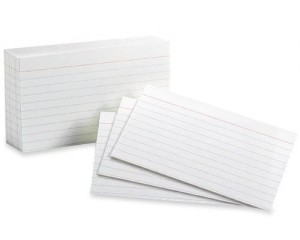
Oxford Ruled Index Cards
There probably isn’t much else I can add about the usefulness of index cards that hasn’t already been covered by the journal and the pocket notebook, so instead I’ll briefly cover the advantages they have over both of these. Like the aforementioned items, index cards are great for taking notes, and while they aren’t quite as convenient to carry around as a pocket-size book, they do have a significant feature that makes up for that: separability.
Notebooks are useful for keeping track of ideas as they come to you; the challenge is sorting through those ideas later. Cutting up pages and sticking pieces together doesn’t seem like a very productive way to go about it (unless you’re into scrapbooking, in which case it may actually be fun). A good alternative, therefore, is to scan through the highlights and note those on separate cards. You can categorize your ideas by topic and sort through them anytime to find the most relevant ones for your current project. Essentially, notebooks are for taking with you to jot down ideas on the go, while index cards are for organizing those ideas in your private workspace. How convenient is that?
While every writer can benefit from using index cards this way, novelists get the most use out of them with an additional purpose. If you’ve ever owned a cork board, you may already be familiar with the concept of pinning notes and pictures in an orderly fashion (if you’re like me, though, they’re probably all pinned haphazardly with no discernible pattern whatsoever). In a similar manner, writers planning out a novel can pin index cards to keep track of character profiles, settings and important plot points, so as to get a clear vision of the story as a whole. For writers who are total scatterbrains, this is an excellent habit to pick up!
Summary
Advantages of Using Index Cards
- Easy to sort ideas
- Categorize topics for quick reference
- Keep track of important plot details
- Visualize novel storyline
Index cards are a great option for many writers, but almost a necessity for novelists. Whether you like to set aside the occasional note for future reference or lay out the entire detailed storyline of an upcoming novel, index cards are a useful tool to help you keep your creativity in order!
by Naomi L. | July 16, 2014 | Blog, Creative Writing |
Time for July’s round of Writer’s Reveal! Once again, it was my turn to suggest the topic of the month, so the prompt I chose this time was: “the story that changed my life”. Hope you enjoy the topic, and be sure to check out everyone else’s take on this subject. Enjoy!
Five Stories That Changed My Life
 I chose this topic because I thought it would be interesting to see how everyone would interpret it. What exactly constitutes a life-changing story? Is it one that took your life in a different direction than it would otherwise have gone? Is it one that motivated you to pursue your dreams? Is it one that made you look at the world differently? There are many ways to define life-changing stories, and I consider mine to be the ones that inspired me to become the writer I am today.
I chose this topic because I thought it would be interesting to see how everyone would interpret it. What exactly constitutes a life-changing story? Is it one that took your life in a different direction than it would otherwise have gone? Is it one that motivated you to pursue your dreams? Is it one that made you look at the world differently? There are many ways to define life-changing stories, and I consider mine to be the ones that inspired me to become the writer I am today.
Now I know the prompt I sent refers to a single story, but when I thought about it, I realized how difficult it would be to choose just one. There are many stories that have played a role in helping me grow as a writer, and I can honestly say that my life would likely have gone a different way were it not for every one of them. So to summarize my journey as a writer and as a person, here are five of the stories that changed my life:
1) The Cat in the Hat – Maybe two years old is too young for anything to be life-changing yet, but reading The Cat in the Hat with my mom is one of the first memories I have of enjoying a good book. Dr. Seuss’s stories sparked my love of reading at an early age, and that was the all-important first step into my passion for creative writing.
2) Charlie and the Chocolate Factory – I’ve loved reading since I was little, but Charlie and the Chocolate Factory was the story that first motivated me to become a writer. Roald Dahl’s colorful worlds and fantastic adventures inspired my imagination, and thanks to his books, I’ve known since I was nine years old that creating stories of my own is what I want to do for the rest of my life.
3) Harry Potter – Wanting to write stories wasn’t enough to make me a writer yet; I had to know how to do it well. J.K. Rowling’s Harry Potter series taught me dozens of excellent storytelling techniques such as character development, plot construction and conservation of detail. These novels are also the reason I decided at age 11 to focus on writing in the fantasy genre.
4) The Mists of Avalon – I first read Marion Zimmer Bradley’s Arthurian fantasy saga at the age of 14, which was a critical point in my personal development. The Mists of Avalon was the series that introduced me to adult themes such as religious fanaticism, political radicalism and feminism, and it did so in a way that made me feel empowered as a woman. These books are what inspired me to create strong female characters, a practice I still keep to today.
5) My parents’ story – This last one isn’t a novel, though I strongly believe it should be. The most inspiring story I’ve ever heard didn’t come from a book, but from my own parents. The story of their relationship is one that has inspired me my whole life, and the best part is that it’s still being written! My parents are the reason I believe in true love, and why I’ve always enjoyed reading and writing romance. It’s not a novel, but it’s still my all-time favorite story!
These are the stories that I believe have changed my life. They may seem simple or insignificant to most, but if they played even the tiniest part in my growth as a writer and a person, then they definitely changed me for the better.
What about you? What are the stories that changed your life?
This has been a special topic post for Writers Reveal, a monthly blog swap among several talented writers. Be sure to check out the other blogs participating in the event. Thanks for reading!
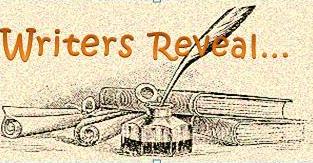
Other bloggers in Writers Reveal
Melissa Khalinsky: Melissa Writes
Becky Fyfe: Imagine! Create! Write!
Ashley Howland: Ghostnapped
Emily Hawker: You Learn Something New Every Day
We’re looking for more bloggers to join our circle! If you’re interested in participating in this monthly roundup, be sure to contact Emily Hawker so she can include you in our email list. Thank you!
by Naomi L. | July 9, 2014 | Blog, Creative Writing |
So recently, I was tagged in a Why I Write chain by Emily Hawker, one of the bloggers in our Writers Reveal circle. Now I have to answer a handful of questions on – you guessed it – why I write. Sounds simple enough. Thanks for tagging me, Emily! Here goes nothing!
Why do I write?
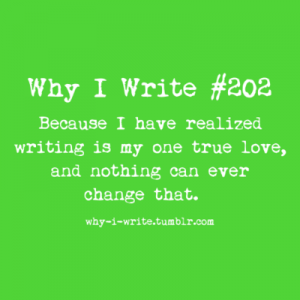 I’ve already covered this question pretty thoroughly in one of my very first blog posts. There are several reasons I write, but they all trace back to one major point. In a nutshell, I write because writing makes me happy. It’s my calling, the air I breathe, the practice that gives my life purpose. It’s the one thing I feel with every last fiber of my being that I was meant to do. I’m not a writer because I write; I write because I am a writer.
I’ve already covered this question pretty thoroughly in one of my very first blog posts. There are several reasons I write, but they all trace back to one major point. In a nutshell, I write because writing makes me happy. It’s my calling, the air I breathe, the practice that gives my life purpose. It’s the one thing I feel with every last fiber of my being that I was meant to do. I’m not a writer because I write; I write because I am a writer.
What am I working on?
Right now, I’m mostly working on this blog and, if they count, academic papers for grad school. I also have plans to compile some short stories for self-publication, as well as devote more time to those sci-fi/fantasy novels that have been bouncing around in my mind for a few years now.
How does my writing differ from others in my genre?
To answer this question, I’d first need to identify my “genre”. Generally speaking, though, I prefer to write stories based on the tons of research I like do on subjects that interest me. In fantasy, much of my writing has roots in ancient mythology, as I mostly write magical creatures based on the mythical beasts I used to read about all the time as a kid. In science fiction, I like to write based on the real scientific subjects I’ve studied in college as a Biology major. And in romance, most of the love relationships I write about start out as friendships, because I’ve learned from my parents’ relationship and personal experience that love based on friendship is the best kind of love. All these practices may not make my writing better than that of other writers, but they certainly make it mine!
Why do I write what I do?
I like to try my hand at as many different styles and genres as I can, but I do have my favorites. I write fantasy and science fiction because they’re a great escape from the confines of reality. I write romance because one of my favorite themes in fiction and in real life is love, and I enjoy expressing my idealistic views on the subject through storytelling. And I write poetry because it’s an excellent emotional outlet.
How does my writing process work?
I don’t really have a set process when it comes to writing, but I suppose it consists of a lot of daydreaming. For most of my work, ideas usually come to me during my idle thinking, and the ones I like best get written down and eventually become the flash fiction stories and poems I share online. As for longer works such as short stories and novels, I spend a significant amount of time planning them in my head before I even write the first word. I focus on telling a good story during the writing stage, and I put equal effort into editing so as to satisfy my high standards for technique. In the end, what I’m (hopefully) left with are stories that I can be proud to present to the world. Though my processes differ from each other, what all my works have in common is that I pour my heart and soul into every word I write. Writing is my ultimate passion, and I wouldn’t have it any other way!
Passing the Torch
Now I’m supposed to tag three people to answer the same questions on why they write. For this chain, I choose Vanessa Levin-Pompetzki, Beth Teliho and Inion N. Mathair (which technically makes four people, but two of them write for the same blog!). Can’t wait to read about why you all write! Good luck, ladies!
by Naomi L. | July 2, 2014 | Blog, Creative Writing, Tropes |
Some time ago, I wrote a blog post about a trope known as Chekhov’s Gun, a literary device in which a seemingly unimportant detail later becomes significant to the plot. But what if you want to achieve the opposite effect, that is, introduce a supposedly important detail that later turns out to have little or nothing to do with the main story? Today’s post features a sister trope that’s equally useful and just as fun to write. Do you enjoy misleading your readers with deceptive clues? Then let me introduce you to the next handy tool in your arsenal: the Red Herring.
Herring? Where?

The “red herring” is a type of heavily cured/smoked kipper. The idiom may have originated from anecdotes relating its use as a tool for misleading hunting dogs.
(CC Image by misocrazy via Flickr)
The Red Herring is a common device in fiction, employed by writers who like to keep readers on their toes. Simply put, it’s a clue intended to lead in the wrong direction. This is an especially useful trope for plots that involve a lot of mystery, as misleading details help to keep the element of surprise. After all, a story in which the major secret is easy to deduce from the beginning isn’t really worth the read, is it?
Like the Chekhov’s Gun, a Red Herring generally relies on the principle of conservation of detail to work properly: every detail presented in a story must have a reason for being there, otherwise it should be discarded. Of course, as mentioned above, a Red Herring functions in the opposite manner as a Chekhov’s Gun in that it’s intended to seem important upon its introduction but is later revealed to have been a distraction from the true secret of the story. The challenge for the audience is trying to tell the fake clues from the real ones!
Placing a Red Herring
Although every Red Herring is purposely used to throw the audience off, the best ones still have some significant connection to the plot even after being revealed as false leads. For instance, a clue can be introduced to set up suspicions about a certain character. This character may later turn out to be innocent, but the clue that seemed to be pointing to them justifies another character as the culprit instead. The example provided on TV Tropes is that of suspects in a hypothetical murder case, but I suppose it could apply to any kind of mystery. The only limit is your own imagination!
For writers who like to get really creative, Red Herrings come in different “flavors”. Subtropes include the Red Herring Shirt, when someone in the background turns out to be an important character; the Red Herring Mole, when a character who seems suspicious turns out to be innocent; and the Red Herring Twist, when a detail played as a potential Chekhov’s Gun turns out to be nothing more than a distraction from the main plot. It’s also possible to create a similar effect with a mistake as opposed to intentional misdirection, while a plot twist confused for a Red Herring due to its overly obvious nature is known as an Untwist.
Overall, I find Red Herrings very enjoyable to write, for when placed well, they can definitely add some interesting twists to a story. Have fun trying them out for yourself, and good luck throwing your readers off with misleading clues!
by Naomi L. | June 25, 2014 | Blog, Creative Writing |
Today I’d like to pay tribute to two wonderful people who are very special to me. They have loved and supported me my entire life, and I’m so grateful for everything they’ve done for me. So to honor them both, here’s my take on why grandparents can be such great sources of stories and creative inspiration. Happy Birthday, Grandma and Grandpa! I love you both so much!
Why Grandparents Make the Best Storytellers
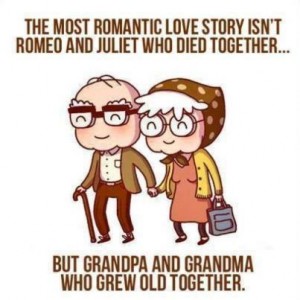 1) They literally have a lifetime of experience to share. A key ingredient to good storytelling is experience. That’s why when writers haven’t been through certain situations firsthand, they research accounts from people who have. Fortunately, some of us are lucky enough to have excellent sources right in our own families, and those are usually the people who have been through the most in life. Grandparents have decades of experience to share, and that adds up to a lifetime of interesting stories (to cite examples from my family, my maternal grandmother was a ballet dancer and my late paternal grandfather was a WWII veteran). You may have a goldmine of creative ideas among your own relatives, so why wouldn’t you want to take advantage of that?
1) They literally have a lifetime of experience to share. A key ingredient to good storytelling is experience. That’s why when writers haven’t been through certain situations firsthand, they research accounts from people who have. Fortunately, some of us are lucky enough to have excellent sources right in our own families, and those are usually the people who have been through the most in life. Grandparents have decades of experience to share, and that adds up to a lifetime of interesting stories (to cite examples from my family, my maternal grandmother was a ballet dancer and my late paternal grandfather was a WWII veteran). You may have a goldmine of creative ideas among your own relatives, so why wouldn’t you want to take advantage of that?
2) They’re living witnesses to how quickly times change. “When I was your age” seems to be a favorite phrase of many elders, and while young people have a tendency to take it for granted, it’s definitely one of those sentence starters that shouldn’t be ignored. History has never changed at such an accelerated pace as it has in the last couple of centuries, to the point where there are references that only people who grew up in a specific decade will understand (I myself am one of the “’90s kids”). That’s why the longer someone has lived, the more they can testify to how quickly times change. So once in a while, stop and listen to what your grandparents have to say about how the world was when they were young. You’re bound to learn about realities you never even imagined!
3) Their stories come with valuable advice. The best stories are those with lessons that can be applied to real life, and grandparents are full of wisdom just waiting to be imparted. Even if they aren’t applicable to your writing, you’re still likely to find a good moral or two by which to live your life. On top of enlightening you about the past, your grandparents can also teach you how to make the most of your future!
4) They’re comfortable with their audience. Isn’t it wonderful when a storyteller is so close with their audience that there are no inhibitions when it comes to sharing a tale? This seems to happen most frequently among family members. Elders often seem eager to pass their knowledge on to younger generations, and anyone patient enough to listen will likely find that this makes for some pretty good storytelling. Grandchildren, remember: if nothing else, you can always appreciate the joy your grandparents feel when telling you their stories!
5) They tell their stories with love! If there’s one thing grandparents have plenty to give, it’s unconditional love! All the stories and wisdom they share with their grandchildren are told with good intentions; they want their loved ones to learn as much as possible about life and to succeed in the world. You should always respect your elders, but especially your grandparents. If they enjoy talking to you and spend hours telling you stories, it’s because they love you!
Are your grandparents still around? Do (or did) you enjoy listening to their stories? What have you learned from them?
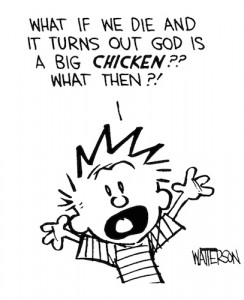



 I chose this topic because I thought it would be interesting to see how everyone would interpret it. What exactly constitutes a life-changing story? Is it one that took your life in a different direction than it would otherwise have gone? Is it one that motivated you to pursue your dreams? Is it one that made you look at the world differently? There are many ways to define life-changing stories, and I consider mine to be the ones that inspired me to become the writer I am today.
I chose this topic because I thought it would be interesting to see how everyone would interpret it. What exactly constitutes a life-changing story? Is it one that took your life in a different direction than it would otherwise have gone? Is it one that motivated you to pursue your dreams? Is it one that made you look at the world differently? There are many ways to define life-changing stories, and I consider mine to be the ones that inspired me to become the writer I am today.


 1)
1) 
Recent Comments